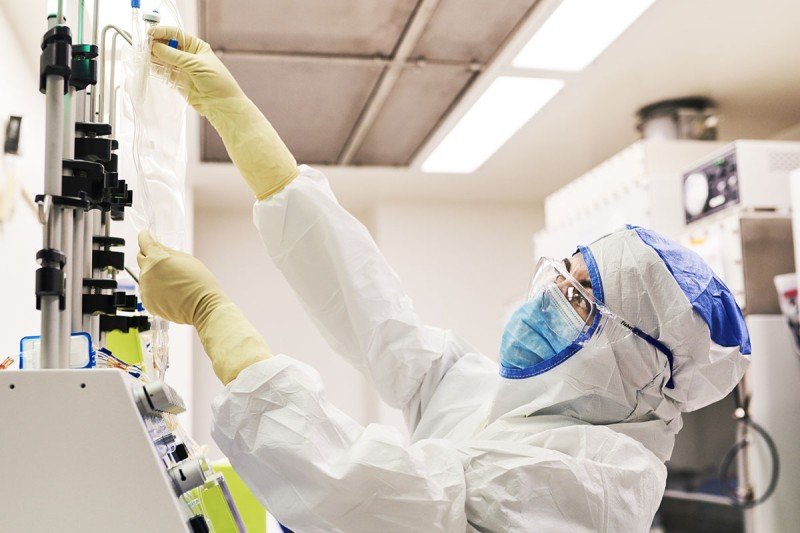
MSK's Cell Therapy and Cell Engineering Facility worked with physician-scientist Michel Sadelain to create a new type of genetically modified immune T cell that can attack cancer.
Cancer treatment using chimeric antigen receptor (CAR) T cells has gained acclaim, thanks to striking success in treating people with several types of advanced blood cancers such as leukemia. The approach, which was pioneered at Memorial Sloan Kettering Cancer Center, involves genetically modifying a person’s immune T cells and equipping them with special receptors that can find cancer in the body. The T cells target a protein, or antigen, that is present on the surface of cancer cells.
But CAR T cell treatment is still not completely effective. Some people don’t respond to the therapy, and some who do nevertheless have their cancer return. One reason is that the T cells often cannot eliminate cancer cells that have very low levels of the antigen that they have been engineered to target and destroy — a problem known as “antigen escape.”

Michel Sadelain
Now a team led by Sloan Kettering Institute (SKI) physician-scientist Michel Sadelain has developed a way to engineer T cells so that they are highly sensitive and capable of targeting and destroying cells with much lower antigen levels. These redesigned cells, called HLA-independent T cell receptor (HIT) T cells, show promise that they could be effective when conventional CAR T therapies would fail.
The research was reported online on January 13, 2022 in Nature Medicine.
“We have learned that conventional CAR T cells require a certain minimum of antigen density on the cancer cell surface in order to work,” says Dr. Sadelain, who is Director of the Center for Cell Engineering. “The new design increases the sensitivity of the T cells by at least tenfold. This treatment option might enable us to prevent disease from coming back, which is what we often see with traditional CARs.”
Pinpoint Gene Editing
When designing CARs, researchers originally relied on modified viruses to deliver the CAR gene to immune cells. This technique caused the gene to be inserted at random into the genome — a scattershot approach that could produce unwanted side effects.
In 2017 Dr. Sadelain’s team used a new tactic, deploying a powerful technology known as CRISPR to put the gene right where they want it — in a genetic region called TRAC. Using TRAC as the “address” allowed them to make better CAR T cells. This advance, reported in Nature, made a huge impact in the field.
Fast-forward several years, and Dr. Sadelain’s team has now figured out a way to use this novel approach to insert a gene for HIT. “We just snip out the gene for the T cell receptor and insert genetic code for this new structure we designed, the HIT receptor,” he says.
The researchers showed the effectiveness of HIT-equipped cells against two human cancers — B cell leukemia and acute myeloid leukemia — that had been implanted in mice.
More Targets in Sight
The experiments suggested that these cells armed with HIT may be effective simply because they act faster than conventional CAR T cells. When antigen levels are low in cancer cells, CAR T cells may not bind long enough to get the job done. The HIT cells kill cancer cells quickly and don’t need to latch on for very long.
“This expands the group of potential targets on cancer cells,” Dr. Sadelain says. “We may no longer be limited to targeting antigens that are abundant for CAR T cells to work. With HIT cells, we can go after a lot of other molecules that we otherwise couldn’t. This could really open up the field.”
Dr. Sadelain says the next step will be a clinical trial testing HIT cells in patients. MSK’s Cell Therapy and Cell Engineering Facility, led by Isabelle Rivière, has already established a process for CRISPR-based editing of CAR T cells and is slated to open a first trial with medical oncologist Jae Park testing slightly different TRAC-edited CAR T cells in 2022.
Back to top